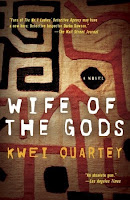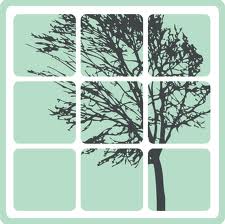
By
Kwei Quartey
In Ghana on the western part of the African arm there is a custom that goes back for generations. Accepted in the past it has become controversial in the present. The custom relates to the Trokosi which is translated to wife of the gods or slave of the gods. These are young women who are given in their early puberty to the holy man of the village to serve him in all ways and to make reparations for possible wrong doings. Traditionalists are in favor of the custom and deny that slavery is involved. The Ghanaian government as well as other organizations oppose the practice.

Detective Inspector Darko Dawson is a city boy who lives in Accra. He is quite pleased with his life as a policeman, husband and father. He has had tragedies in his past having lost his mother when she disappeared after a visit to her sister in Ketanu, and when his brother was severely and permanently injured in an accident.
 |
| Accra |
 A young medical student, Gladys Mensah was helping out in the village of Ketanu bringing education about sanitation and AIDS. She was also trying to help the young girls and women known as the Trokosi. One day she is found murdered near the area where the village priest/holy man lived. One of the trokosi Efia is the person who finds the body. Many years ago Efia’s uncle murdered a man and was imprisoned,but the family feels they have been cursed and are suffering from the gods displeasure. The elders of her family go to the high priest, Togbe who communes with the gods and tells them that all will be well if they bring him a female child to serve at the shrine. She will belong to the gods and she will give birth to the children they give her through Togbe. Thus at the age of twelve, Efia becomes a wife of the gods.
A young medical student, Gladys Mensah was helping out in the village of Ketanu bringing education about sanitation and AIDS. She was also trying to help the young girls and women known as the Trokosi. One day she is found murdered near the area where the village priest/holy man lived. One of the trokosi Efia is the person who finds the body. Many years ago Efia’s uncle murdered a man and was imprisoned,but the family feels they have been cursed and are suffering from the gods displeasure. The elders of her family go to the high priest, Togbe who communes with the gods and tells them that all will be well if they bring him a female child to serve at the shrine. She will belong to the gods and she will give birth to the children they give her through Togbe. Thus at the age of twelve, Efia becomes a wife of the gods.
Witchcraft and traditionalist healing and spirituality are essential elements of the story. DI Dawson has more modern beliefs and he decries old fashioned notions This is what makes this story especially satisfying, the juxtaposition between a modern city like Accra and life in a rural area such as Ketanu.
 Dawson is sent to the location to clear up this case. He has relatives in the area and he speaks the local language Ewe. He has mixed feeling because he feels more at home with concrete under his feet and memories of the disappearance of his mother in this part of Ghana have kept him from visiting his family, his mother's sister for decades. But on the other hand he may re investigate this mystery as well. He too, has a foot in both worlds even though he has tried to put the past behind him.
Dawson is sent to the location to clear up this case. He has relatives in the area and he speaks the local language Ewe. He has mixed feeling because he feels more at home with concrete under his feet and memories of the disappearance of his mother in this part of Ghana have kept him from visiting his family, his mother's sister for decades. But on the other hand he may re investigate this mystery as well. He too, has a foot in both worlds even though he has tried to put the past behind him.This is a story of contrasts. The reader gets a better sense of Ghana because of the inclusion of both the city and the country life. The elements of the story that give a picture of the past make the present stand out as the culture of the Ghanaians evolves as do all ways of life. Solving a mystery with modern techniques at hand make the witchcraft stand out in stark relief. Finally, Gladys and Efia are women who belong to two different worlds but in a small town in Ghana, their stories come together in a nice contrast.
 This book has been compared to Alexander McCall Smith's Botwana mysteries, but aside from the African setting most things are quite different. The pace, the characters and the subject matter make this a unique mystery of Africa. I am really looking forward to the next in the series Children of the Street.
This book has been compared to Alexander McCall Smith's Botwana mysteries, but aside from the African setting most things are quite different. The pace, the characters and the subject matter make this a unique mystery of Africa. I am really looking forward to the next in the series Children of the Street.

No comments:
Post a Comment